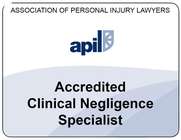medical negligence
Widow secures six figure sum after 5 year delay in diagnosing husband’s brain tumour

Nick suffered a massive stroke when the doctors tried to remove a tumour which should have been diagnosed and removed several years earlier. Sadly he died a few years later from a cardiac arrest.
Janine Collier, Partner Tees’ medical negligence team, helped Nick’s widow to pursue a claim against Nick’s optician and ophthalmologist for a delay in investigating a visual field defect (a sign of a brain tumour).
Nick, a gentleman in his 40s, had always been fit and healthy. He married Barbara and had worked all of his life, providing for her and the family. They were both looking forwards to a long future and retirement together. All that changed when Nick was diagnosed with a brain tumour and suffered a catastrophic stroke as a result of surgical complications.
Nick had visited his local optician as he had slightly blurred vision in one of his eyes some years previously. The optician did some tests (including a visual field test) and told him that his symptoms were due to a lazy eye. Nick felt that there was more to it and so the optician asked Nick’s GP to refer him to the ophthalmology department at his local hospital.
The ophthalmologist told Nick that he had impending presbyopia (a progressive loss of the ability to focus near due to ageing) and discharged him.
Over 5 years later, Nick suffered an episode of blurred vision, a problem with his speech and a feeling of heaviness in one of his arms and legs. Brain imaging was carried out and a pituitary adenoma (a brain tumour) was found to be compressing part of his brain.
Over the next few weeks, Nick’s condition deteriorated and he was admitted for surgery (a transsphenoidal hypophysectomy) to attempt to remove the tumour. It was not possible to remove the whole tumour because it had invaded key structures in the brain. Unfortunately, he suffered a haemorrhage and required further surgery (a right pterional craniotomy and decompression of the suprasellar region) a few days later.
During that surgery, Nick suffered a major stroke – he lost movement on one side in his arm and leg) and he had very limited and blurry vision on one side, with the vision on the other fixed straight ahead.
The stroke having caused severe damage to Nick’s mobility and functionality meant he spent most of his time in his wheelchair and Barbara cared for him. Although he had worked all of his life, he had to take early retirement.
Unexpectedly, Nick died some four years later as a result of a heart attack.
How we helped
Nick and Barbara were utterly shocked by the diagnosis of the brain tumour and the implications this would have for their future. This was even more so after Nick suffered the catastrophic stroke as a complication of his surgery. They had niggling concerns that in the preceding years Nick had seen a number of healthcare professionals and that the tumour should have been diagnosed sooner. Nick and Barbara asked Tees if they had a claim for negligence.
Janine Collier, Partner in Tees’ medical negligence team said “When I met Nick and Barbara I was struck by what a lovely couple they were. They were facing an uncertain future and I wanted to help them understand what had happened and to obtain some financial security for them to meet Nick’s needs in the future.”
Janine reviewed all of the evidence and identified that a visual field defect (a sign and symptom of a brain tumour) had been identified by the optician some five years earlier, but this had not been acted upon. Although the optician had referred Nick to the ophthalmologist, the defect was not mentioned in the referral form and the ophthalmologist had not looked at the visual field test. Importantly, had the visual field defect been investigated (as it should have been) at that time, Nick’s brain tumour would have been diagnosed some 5 years earlier. Although it may well still have been the case that the tumour could not have been completely removed, the surgery would have been less complex as the tumour would have been much smaller and would have been less invasive. Nick would have had normal vision in both eyes and would not have suffered the stroke.
Liability was denied by both the optician and the Hospital Trust and so it was necessary to issue court proceedings. The case was settled, shortly after Nick’s death. Barbara wrote 'You really have made things as painless as possible Janine, and always explained things in a way I could understand, it has felt hard to carry on without [Nick], but I know he would be pleased that, I don't need to worry about not having any pension etc, and will be able to help our daughters.
Caring and sensitive support with Tees
Whatever your situation, our legal specialists are here to help guide you. Our expert clinical negligence lawyers will handle your claim from the initial consultation through to financial settlement.
Call for a FREE initial consultation on 0800 013 1165 Alternatively, you can fill out our enquiry form and we will let you know how we can help. We can also visit you at your home if you wish.
Our medical negligence lawyers are based in:
- Cambridgeshire: Cambridge
- Essex: Brentwood, Chelmsford and Saffron Walden
- Hertfordshire: Bishop's Stortford & Royston
But we can help you wherever you are in England and Wales.
Chat to the Author, Janine Collier
Executive Partner, Medical Negligence, Cambridge office
Meet Janine
- Areas of expertise
- Accreditations
- Testimonials
Legal 500 UK 2025
East Anglia
Janine Collier - one of the outstanding practitioners in the country. Not only excellent on all her own cases but ensures the standards of the whole team are extremely high.
Legal 500 UK 2025
East Anglia
Janine Collier is an excellent solicitor and runs a very dedicated and efficient team.
Legal 500 UK 2025
East Anglia
Janine Collier is exceptional for her detailed factual and legal analysis of claims, the high standard of her instructions, and her sensitive client management. Her energy is remarkable.
Legal 500 UK 2025
East Anglia
Janine Collier is an extremely able and committed lawyer; apart from her skill as a litigator and negotiator, Janine is known for going the extra mile for her clients. Janine's tenacity is evident from the excellent case outcomes she achieves; even in the most complex of cases, she is unafraid to litigate if the right settlement cannot be achieved, but her negotiating skills are such that she sees the benefits of settlement where the award is at an appropriate level as this provides certainty that does not follow litigation.
Legal 500 UK 2025
East Anglia
'Janine Collier inspired confidence and put us at ease. Janine always showed great empathy, and we felt we weren't treated simply as a case but as individuals. She was in regular contact by phone/email - even out of hours when required. She built a great team of experts for our case - and regularly questioned and challenged them. She also found us a good case manager, who found us experts who could really help us - and she negotiated an advance on our settlement to fund these.
Anonymous
Cambridge
Janine was extremely compassionate and caring about my experiences. Her words have remained dear to my heart and kept me strong throughout this process. She is a remarkable lady who truly wanted the best outcome for me. Anytime I contacted her, she always explained everything thoroughly and in detail. My queries were always resolved in her presence. She has a very good heart.
Legal 500 UK 2024
East Anglia
Janine Collier is a stand-out. She would be coveted by all top firms. An excellent leader, an excellent litigator.
Legal 500 UK 2024
East Anglia
Janine Collier has been brilliant throughout our whole process, and I have felt extremely supported and able to trust that she has my son’s best interests in mind with everything she does.
Legal 500 UK 2024
East Anglia
Janine Collier is hugely able and extremely hard-working – a perfect leader of the team as well as a fantastic litigator.
Legal 500 UK 2023
'Janine Collier has an amazing reputation and quite rightly, she very quickly spotted something that wasn’t the main focus of the case but is able to zoom out and look at everything that’s going on and spot things others wouldn’t spot. You can tell she really cares and is a very dedicated person who just wants to help. The team are all caring and efficient'
A
Cambridge
'A heartfelt thank you for all you have done in preparation for and during the settlement meeting, as well as for your unfailing support along the way, in and out of hours. It is undoubtedly due to your high professionalism if the outcome today has exceeded all expectations; it will be a huge help for us going forward and we will be forever grateful'
Chambers & Partners 2022
Cambridge
'Janine Collier is renowned for her handling of delay in diagnosis, obstetric injury and surgical negligence claims. She is at the top of her game and knows clinical negligence inside and out'
Susan Hickman
Cambridge
'We consider ourselves fortunate to have been recommended to Tees by the solicitor we initially approached. We did not realise it until the case was well established that the level of professional care we were receiving was exceptional and that the experience of the individuals and the contacts they have to assist in a very complex case was the best available. We are grateful that we received a satisfactory settlement as a result of their efforts under difficult circumstances and dealing with defendants that were obstructive and disorganised. By far the greatest benefit for us however is the fact that the victim, with assistance from highly skilled experts that we would not have known about otherwise, learned to walk short distances when all other medical opinion did not consider this possible. This was their greatest achievement which is well beyond the service we expected'
The Fisher family
Janine works with empathy, understanding and compassion. She handled our mother's inquest with skill and sensitivity and guided us expertly. She kept us informed continually via email and multiple meetings and phone calls. Janine completely took the sting and the stress out of our case.







